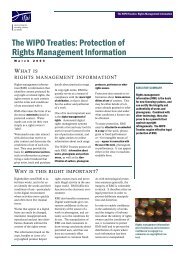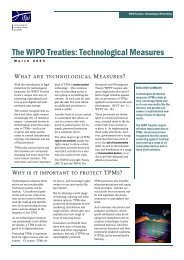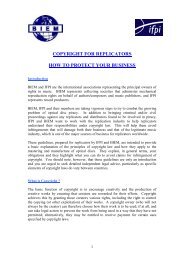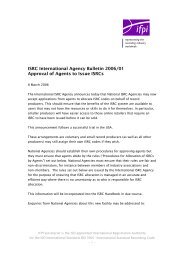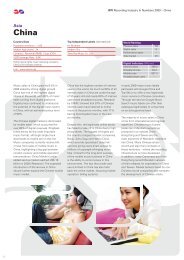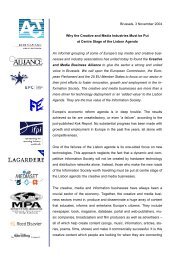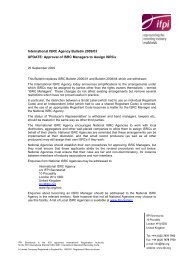*IFIC 20ppv3 - IFPI
*IFIC 20ppv3 - IFPI
*IFIC 20ppv3 - IFPI
You also want an ePaper? Increase the reach of your titles
YUMPU automatically turns print PDFs into web optimized ePapers that Google loves.
PAGE 17<br />
REGIONAL OVERVIEW<br />
ASIA-PACIFIC<br />
EUROPE<br />
Most governments in the<br />
Asia-Pacific region increased<br />
their efforts and provided more<br />
resources towards fighting piracy<br />
in 2004, and there have been<br />
modest gains in reducing<br />
piracy levels.<br />
However, Asia still has the world’s<br />
highest production capacity of<br />
both pressed and blank optical<br />
discs. Encouragingly, a number<br />
of territories’ piracy rates have<br />
now fallen slightly, but piracy<br />
levels in China and Indonesia<br />
remained unacceptably high<br />
at over 80%.<br />
The experience in Asia shows<br />
that success against music piracy<br />
is achievable where government<br />
demonstrates a strong and visible<br />
political will to rid the territory<br />
of piracy.<br />
Piracy in Asia tends to seek out<br />
the points of weak enforcement.<br />
There has been a shift of disc<br />
production facilities from territories<br />
such as Singapore, Hong<br />
Kong and Taiwan to Vietnam<br />
and others places in the Mekong<br />
Delta, where there is little or no<br />
copyright protection and a lack<br />
of real enforcement. At the same<br />
time CD-R piracy is on the<br />
increase in many territories.<br />
Malaysia for example, continues<br />
to be a major exporter of pirate<br />
discs, while Pakistan is now one<br />
of the biggest exporters of pirate<br />
discs in the world. Exported discs<br />
Pirate product seized in Taiwan<br />
manufactured in China are<br />
increasing throughout the<br />
Asia region.<br />
In the Philippines, the fight against<br />
piracy is hampered by a lack of<br />
government resources and a lack<br />
of adequate legislation to regulate<br />
the numerous optical disc plants<br />
producing pirate products for the<br />
domestic and international markets.<br />
It is believed that some of<br />
these factories are set up with<br />
the help of funds from organised<br />
crime groups based in Malaysia<br />
and Taiwan.<br />
Pirate products manufactured in<br />
the Philippines have in the past<br />
found their way into many<br />
international markets. However,<br />
the Philippine government in<br />
2004 introduced new legislation<br />
for disc plants, which it is hoped,<br />
will help to control the manufacture<br />
of illegal discs in the country.<br />
Optical disc regulations have<br />
also been passed in Indonesia<br />
and Thailand, and are under<br />
consideration in India.<br />
Improvements in the physical<br />
piracy situation in Asia are offset<br />
by a sharp increase in the illegal<br />
distribution of music via websites<br />
and file-sharing. Taiwan and<br />
South Korea have seen the size<br />
of their legitimate markets<br />
drop drastically.<br />
Immediate remedies are needed<br />
to resolve and control the spread<br />
of online piracy in those countries.<br />
EUROPEAN UNION<br />
Markets in Western Europe, and<br />
in particular Southern Europe<br />
where organised crime is heavily<br />
involved, continue to suffer from<br />
CD-R piracy. The problem is<br />
exacerbated by the accession of<br />
new countries in Eastern Europe,<br />
and weak border controls and<br />
rogue plants in the EU.<br />
Spain has seen stepped-up<br />
enforcement and the new publicprivate<br />
commission, aimed at<br />
addressing problems in intellectual<br />
property protection and<br />
reinforcing laws, is a step in the<br />
right direction.<br />
Italian organised crime groups<br />
remain actively involved in music<br />
piracy. Police are clamping down<br />
but court procedures are slow<br />
and there is a lack of deterrent<br />
sentencing.<br />
Greece has one of the highest<br />
piracy rates in the EU at 50%.<br />
There is an inefficient court system<br />
and leniency towards even<br />
notorious repeat offenders.<br />
The eastward expansion of the<br />
EU, and the relaxing of border<br />
controls, has facilitated the influx<br />
of infringing discs into Western<br />
Europe. There is poor enforcement<br />
at the EU’s borders with<br />
pirate hot-spots Russia, Belarus,<br />
Bulgaria and Ukraine. Once pirate<br />
product crosses these borders<br />
it can circulate freely within 25<br />
countries.<br />
There are now several EU<br />
instruments to fight piracy:<br />
The EU Enforcement Directive<br />
due to enter into force by April<br />
2006 includes civil measures and<br />
procedures concerning injunctions,<br />
the freezing of assets and<br />
guidelines on awarding damages.<br />
Significantly, it also allows for a<br />
presumption of ownership if a<br />
rights holder’s name appears on<br />
a sound recording.<br />
The European Commission has<br />
also made proposals aimed at<br />
increasing criminal sanctions, for<br />
example, prison sentences of at<br />
least ten years for leaders of<br />
organised crime groups.<br />
The Council and the Commission<br />
both reinforced their customs regulations<br />
to halt pirate products at<br />
EU borders. In February 2005, the<br />
Commission released figures<br />
showing a 172% increase in the<br />
seizure of pirate discs for 2003<br />
and the first three quarters of 2004.<br />
The Commission adopted in<br />
2004 a new plan which provides<br />
a global approach to the issue of<br />
IPR enforcement in third countries<br />
and sets out eight proposals for<br />
EU action, from the drafting of a<br />
‘priority countries list’ to bilateral<br />
and multilateral trade actions and<br />
technical assistance.<br />
EASTERN EUROPE<br />
Although high quality counterfeit<br />
CDs are found throughout the<br />
region, the pressed disc is losing<br />
ground to burned CD-Rs, which<br />
are prevalent in the pirate<br />
markets of the Balkans, Bulgaria,<br />
Romania, Turkey and Ukraine.<br />
Romania’s piracy level is 55%,<br />
due to a continued lack of<br />
focused enforcement action<br />
and serious judicial shortcomings.<br />
Serbia & Montenegro, where<br />
music piracy is around 80%,<br />
slipped back after a slight<br />
improvement in 2003. The<br />
new Serbian government has<br />
prioritised IPR enforcement, but<br />
the necessary clamp down on<br />
pirate street sales has yet to<br />
materialise.<br />
The piracy level in Turkey has<br />
increased to 56%, despite the<br />
ban on sales of audio-visual<br />
products, which has reduced<br />
the number of blatant pirate<br />
sellers in Turkey’s cities.<br />
Russia’s piracy problem remains<br />
one of the world’s worst, with a<br />
piracy level of 66%.<br />
The industry’s priorities in the CIS<br />
states are Kazakhstan, Belarus,<br />
Moldova and Georgia. Elsewhere<br />
the markets are too small (or,<br />
as Uzbekistan too distant) and<br />
unregulated. There is no meaningful<br />
activity by police, customs,<br />
or judiciary throughout the CIS.




